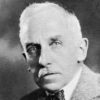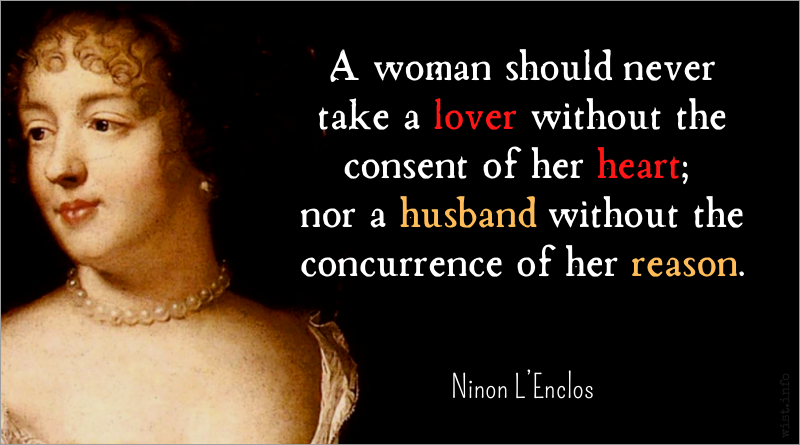I had a very pleasant evening, however, though you will probably find out that there was no particular reason for it; but I do not think it worth while to wait for enjoyment until there is some real opportunity for it.
Quotations about:
reason
Note not all quotations have been tagged, so Search may find additional quotes on this topic.
Men can be unjust, because it is in their interest to act so, and they prefer their own satisfaction to that of others. They always act with themselves in mind. No one is gratuitously wicked; there must be a determining cause, and it is always one of self-interest.
[Les hommes peuvent faire des injustices, parce qu’ils ont intérêt de les commettre et qu’ils préfèrent leur propre satisfaction à celle des autres. C’est toujours par un retour sur eux-mêmes qu’ils agissent: nul n’est mauvais gratuitement; il faut qu’il y ait une raison qui détermine, et cette raison est toujours une raison d’intérêt.]
Charles-Lewis de Secondat, Baron de Montesquieu (1689-1755) French political philosopher
Persian Letters [Lettres Persanes], Letter 84, Usbek to Rhédi (1721) [tr. Healy (1964), # 83]
Montesquieu's argues that an omnipotent God must be just, because God has no interest that cannot be satisfied through injustice.
(Source (French)). Alternate translations:
Men may commit injustice, because it is in their interest to do it, and they chuse rather to satisfy themselves and others. It is always with an eye to themselves that they act: no body is wicked gratis: he will have some reason to sway him; and that reason is always a reason of interest.
[tr. Ozell (1760 ed.)]
Men may do injustice, because it is in their interest to commit it, and because they prefer their own private satisfaction to that of others. It is always with a view to themselves that they act: nobody is wicked for nothing: he must have some reason that determines himl and this reason is always a reason of interest.
[tr. Floyd (1762), # 83]
Men act unjustly, because it is their interest to do so, and because they prefer their own satisfaction to that of others. They act always to secure some advantage to themselves: no one is a villain gratis; there is always a determining motive, and that motive is always an interested one.
[tr. Davidson (1891)]
Men act unjustly, because it is their interest to do so, and they prefer their own satisfaction to that of others. In acting they always have in view the effect their action will have on themselves: no one is bad for nothing; every one must have a determining motive, and that motive is self-interest.
[tr. Betts (1897)]
Men can commit injustices, because it is in their interest to do so, and they would rather satisfy themselves than others. It is always through thinking of themselves that they act unjustly; no one is gratuitously bad, there must be a reason which determines the act, and that reason is invariably one of self-interest.
[tr. Mauldon (2008)]
Men are capable of injustice, because their self-interest leads them toward it, and because they prefer their own satisfaction to that of others. Everything always revolves around themselves. No evil is ever done gratuitously, for there is always a reason behind it, and that reason is always one of self-interest.
[tr. MacKenzie (2014), # 83]
No desire is more natural than the desire for knowledge. We assay all the means that can lead us to it. When reason fails us we make use of experience. Experience is a weaker and less dignified means: but truth is so great a matter that we must not disdain any method that leads us to it.
[Il n’est desir plus naturel que le desir de cognoissance. Nous essayons tous les moyens qui nous y peuvent mener. Quand la raison nous faut, nous y employons l’experience. Qui est un moyen de beaucoup plus foible et plus vil. Mais la verité est chose si grande, que nous ne devons desdaigner aucune entremise qui nous y conduise.]
Michel de Montaigne (1533-1592) French essayist
Essays, Book 3, ch. 13 “On Experience [De l’Experience]” (1588) (3.13) (1595) [tr. Screech (1987)]
(Source)
Aristotle's Metaphysics opens with the phrase "All men by nature desire knowledge."
The 1595 edition included a quotation from Manilius inserted after the word "experience" (omitted here). It also added the second descriptor (after "weaker") of how experience compares to reason.
(Source (French)). Alternate translations:
There is no desire more naturall, then that of knowledge. We attempt all meanes that may bring us unto it. When reason failes us, we employ experience. Which is a meane by much more, weake and vile. But trueth is of so great consequence, that wee ought not disdaine any induction, that may bring us unto it.
[tr. Florio (1603)]
There is no Desire more natural than that of Knowledge: We try all Ways that can lead us to it; where Reason is wanting, we therein employ Experience which is a Means much more weak and cheap. But Truth is so great a thing, that we ought not to disdain any Mediation that will guide us to it.
[tr. Cotton (1686)]
There is no desire more natural than that of knowledge. We try all ways that can lead us to it; where reason is wanting, we therein employ experience which is a means much more weak and cheap; but truth is so great a thing, that we ought not to disdain any mediation that will guide us to it.
[tr. Cotton/Hazlitt (1877)]
There is no desire more natural than the desire for knowledge. We make trial of all means that can lead us to it. When reasoning fails us, we then make use of experience, which is a much feebler and lower means; but truth is so great a thing that we must not disdain any medium that leads us to it.
[tr. Ives (1925)]
There is no desire more natural than the desire for knowledge. We try all the ways that can lead us to it. When reason fails us, we use experience, which is a weaker and less dignified means. But truth is so great a thing that we must not disdain any medium that will lead us to it.
[tr. Frame (1943)]
It is the head that governs men. A kind heart is of no use in a chess game.
[On gouverne les hommes avec la tête. On ne joue pas aux échecs avec un bon cœur.]
Nicolas Chamfort (1741-1794) French writer, epigrammist (b. Nicolas-Sébastien Roch)
Products of Perfected Civilization [Produits de la Civilisation Perfectionée], Part 1 “Maxims and Thoughts [Maximes et Pensées],” ch. 8, ¶ 522 (1795) [tr. Merwin (1969)]
(Source)
(Source (French)). Alternate translations:
People are governed with the head; kindness of heart is little use in chess.
[tr. Mathers (1926)]
Men are governed using the head. A kind heart is useless in a chess game.
[tr. Dusinberre (1992)]
A person governs men with his head. One does not play chess with goodness of heart.
[tr. Siniscalchi (1994), ¶ 521]
An elegant writer has observed, that wit may do very well for a mistress, but that he should prefer reason for a wife. He that deserts the latter, and gives himself up entirely to the guidance of the former, will certainly fall into many pitfalls and quagmires, like him, who walks by flashes of lightning, rather than by the steady beams of the sun.
Charles Caleb "C. C." Colton (1780-1832) English cleric, writer, aphorist
Lacon: Or, Many Things in Few Words, Vol. 1, § 71 (1820)
(Source)
The great calamity of the passions is not the torments they cause but the wrongs, the base actions that they lead one to commit, and which degrade men. Without these hindrances the advantages of the passions would far outweigh those of cold reason, which renders no one happy. The passions make a man live, wisdom merely makes him last.
[Le grand malheur des passions n’est pas dans les tourmens qu’elles causent, mais dans les fautes, dans les turpitudes qu’elles font commettre, et qui dégradent l’homme. Sans ces inconvéniens, elles auraient trop d’avantage sur la froide raison, qui ne rend point heureux. Les passions font vivre l’homme, la sagesse le fait seulement durer.]
Nicolas Chamfort (1741-1794) French writer, epigrammist (b. Nicolas-Sébastien Roch)
Products of Perfected Civilization [Produits de la Civilisation Perfectionée], Part 1 “Maxims and Thoughts [Maximes et Pensées],” ch. 2, ¶ 118 (1795) [tr. Merwin (1969)]
(Source)
(Source (French)). Alternate translations:
The great evil of the passions does not lie in the torments which they bring upon men, but in the faults and shameful actions they cause him to commit. Were it not for this drawback they would have too great an advantage over cold reason, which can never be productive of happiness. His passions make man live, his wisdom only makes him last.
[tr. Mathers (1926)]
The unfortunate thing about passions is not the misery they make one commit, and which degrade man. Without these disadvantages, they would overpower cold reason, which does not in the least a source of happiness. Passions make men live, wisdom only makes the endure.
[tr. Pearson (1973)]
The great disaster of passions is not the torment they cause, but the debasing errors and depravity into which they lead men. Without these drawbacks, passion would enjoy many advantages over cold reason, which never produces happiness. Passions enable men to live, wisdom merely enables them to survive.
[tr. Dusinberre (1992)]
The great misfortune of passions does not come from the torments that they cause, but from the base things they make a person do, and which degrade him. Without these inconveniences, they would have too many advantages over cold reason, which never makes people happy. Passions make a man live, wisdom and facts only make him endure.
[tr. Siniscalchi (1994)]
A wise man neither lets himself be governed nor seeks to govern others: he wishes reason alone to govern, and for ever.
[Un homme sage ni ne se laisse gouverner, ni ne cherche à gouverner les autres: il veut que la raison gouverne seule et toujours.]
Jean de La Bruyère (1645-1696) French essayist, moralist
The Characters [Les Caractères], ch. 4 “Of the Heart [Du Coeur],” § 71 (4.71) (1688) [tr. Stewart (1970)]
(Source)
(Source (French)). Alternate translations:
A Wise Man neither suffers himself to be govern'd, nor attempts to govern others. 'Tis his reason alone which always governs him.
[Bullord ed. (1696)]
A Wise Man neither suffers himself to be govern'd, nor attempts to govern others. He wou'd have Reason alone always to govern him.
[Curll ed. (1713)]
An intelligent man neither allows himself to be controlled nor attempts to control others; he wishes reason alone to rule, and that always.
[tr. Van Laun (1885)]
There are some men who listen neither to reason nor to good advice, and who deliberately go astray through fear of being dominated.
[Il se trouve des hommes qui n’écoutent ni la raison ni les bons conseils, et qui s’égarent volontairement par la crainte qu’ils ont d’être gouvernés.]
Jean de La Bruyère (1645-1696) French essayist, moralist
The Characters [Les Caractères], ch. 4 “Of the Affections [Du Coeur],” § 71 (4.71) (1688) [tr. Stewart (1970)]
(Source)
(Source (French)). Alternate translations:
There are those men who will not hearken to reason, or good council, but deviate of their own Heads, purely for fear of being govern'd.
[Bullord ed. (1696)]
There are some Men who will not hearken to Reason and good Counsel, but deviate of their own Heads, purely for fear of being govern'd.
[Curll ed. (1713)]
There are some Men who turn the deaf Ear to Reason and friendly Counsel, and play the Fool of their own Heads, purely for fear of being governed.
[Browne ed. (1752)]
There are some men who turn a deaf ear to reason and good advice, and willfully go wrong for fear of being controlled.
[tr. Van Laun (1885)]
There is no logical explanation for despair. You can no more reason yourself into cheerfulness than you can reason yourself an extra six inches in height. You can only be better prepared.
Stephen Fry (b. 1957) British actor, writer, comedian
Speech, Samaritans annual report launch, London (1996-05-17)
Regarding the emotional breakdown which led him once to abandon a play in mid-production, and subsequently again contemplate suicide. The Samaritans are a suicide-prevention group.
Quoted in Gary Younge, "Enter Fry, centre stage, for bravura performance on depression and suicide," The Guardian (1996-05-18).
Everything beautiful and noble is the result of reason and calculation. Crime, of which the human animal has learned the taste in his mother’s womb, is natural by origin. Virtue, on the other hand, is artificial, supernatural, since at all times and in all places gods and prophets have been needed to teach it to animalized humanity, man being powerless to discover it by himself. Evil happens without effort, naturally, fatally; Good is always the product of some art.
[Tout ce qui est beau et noble est le résultat de la raison et du calcul. Le crime, dont l’animal humain a puisé le goût dans le ventre de sa mère, est originellement naturel. La vertu, au contraire, est artificielle, surnaturelle, puisqu’il a fallu, dans tous les temps et chez toutes les nations, des dieux et des prophètes pour l’enseigner à l’humanité animalisée, et que l’homme, seul, eût été impuissant à la découvrir. Le mal se fait sans effort, naturellement, par fatalité ; le bien est toujours le produit d’un art.]
Charles Baudelaire (1821-1867) French poet, essayist, art critic
“Le Peintre de la Vie Moderne [The Painter of Modern Life],” sec. 11 (1863) [tr. Mayne (1964)]
(Source)
(Source (French)). Alternate translation:
Everything beautiful and noble is the result of reason and calculation. Crime, for which the human creature has acquired a taste in its mother’s womb, is natural in origin. Virtue, on the contrary, is artificial, unnatural since, at all times and among all nations, gods and prophets were necessary to teach virtue to animalistic humanity, which humanity alone was unable to discover. Evil occurs without effort, naturally, through fatality; good is always the product of artifice.
[tr. Kline (2020)]
Prejudice in favour of one’s own country, combined with national pride, makes us forget that reason is found in every land, and sound thoughts wherever there are men. We should not like to be thus treated by those whom we call barbarians; and if we ourselves display a certain barbarism, this consists in being panic-stricken at seeing men of another nation reason as we do ourselves.
[La prévention du pays, jointe à l’orgueil de la nation, nous fait oublier que la raison est de tous les climats, et que l’on pense juste partout où il y a des hommes. Nous n’aimerions pas à être traités ainsi de ceux que nous appelons barbares; et s’il y a en nous quelque barbarie, elle consiste à être épouvantés de voir d’autres peuples raisonner comme nous.]
Jean de La Bruyère (1645-1696) French essayist, moralist
The Characters [Les Caractères], ch. 12 “Of Opinions [Des Jugements],” § 22 (12.22) (1688) [tr. Stewart (1970)]
(Source)
(Source (French)). Alternate translations:
Our prepossession in favour of our Country, join'd to the pride of our Nation, makes us forget that Reason belongs to all Climates, and just Thoughts to all places where there are Men. We should not like to be so treated by those we call Barbarians; if amongst us there is any barbarity, it is in being amaz'd at the hearing other People reason like our selves.
[Curll ed. (1713)]
Our Prepossession in the Favour of our Country, joined to a national Pride, makes us forget that Reason is the Growth of all Climates, and that a Justness of Sentiment is not limited to a Part of Europe: It would enrage us to be so treated by those whom we are pleased to call Barbarians; if amongst us there is any Barbarism, 'tis in being amazed at hearing other People reason like ourselves.
[Browne ed. (1752)]
Our prepossession in favour of our native country and our national pride makes us forget that common sense is found in all climates, and correctness of thought wherever there are men. We should not like to be so treated by those we call barbarians; and if some barbarity still exists amongst us, it is in being amazed on hearing natives of other countries reason like ourselves.
[tr. Van Laun (1885)]
Although reason were intended by Providence to govern our passions; yet it seems that in two points of the greatest moment to the being and continuance of the world, God has intended our passions to prevail over reason. The first is, the propagation of our species; since no wise man ever married from the dictates of reason. The other is, the love of life; which, from the dictates of reason, every man would despise, and wish it at an end, or that it never had a beginning.
For Justice is one; it binds all human society, and is based on one Law, which is right reason applied to command and prohibition. Whoever knows not this Law, whether it has been recorded in writing anywhere or not, is without Justice.
[Est enim unum ius quo deuincta est hominum societas et quod lex constituit una, quae lex est recta ratio imperandi atque prohibendi. Quam qui ignorat, is est iniustus, siue est illa scripta uspiam siue nusquam.]
Marcus Tullius Cicero (106-43 BC) Roman orator, statesman, philosopher
De Legibus [On the Laws], Book 1, ch. 15 (1.15) / sec. 42 [Marcus] (c. 51 BC) [tr. Keyes (1928)]
(Source)
(Source (Latin)). Alternate translations:
There can be but one essential justice, which cements society, and one law which establishes this justice. This law is right reason, which is the true rule of all commandments and prohibitions. Whoever neglects this law, whether written or unwritten, is necessarily unjust and wicked.
[tr. Barham (1842)]
For there is but one essential justice which cements society, and one law which establishes this justice. This law is right reason, which is the true rule of all commandments and prohibitions. Whoever neglects this law, whether written or unwritten, is necessarily unjust and wicked.
[tr. Barham/Yonge (1878)]
There is one, single, justice. It binds together human society and has been established by one, single, law. That law is right reason in commanding and forbidding. A man who does not acknowledge this law is unjust, whether it has been written down anywhere or not.
[tr. Rudd (1998)]
There is only one justice, which constitutes the bond among humans, and which was established by the one law, which is right reason in commands and prohibitions. The person who does not know it is unjust, whether the law has been written anywhere or not.
[tr. Zetzel (1999)]
Right is uniform; human fellowship has been bound by it, and one law has established it; that law is correct reason in commanding and prohibiting. He who is ignorant of it is unjust, whether it has been written somewhere or nowhere.
[tr. Fott (2013)]
Law is the highest reason, rooted in nature, which commands things that must be done and prohibits the opposite.
[Lex est ratio summa, insita in natura, quae iubet ea quae facienda sunt, prohibetque contraria.]
Marcus Tullius Cicero (106-43 BC) Roman orator, statesman, philosopher
De Legibus [On the Laws], Book 1, ch. 6 (1.6) / sec. 18 [Marcus] (c. 51 BC) [tr. Zetzel (1999)]
(Source)
Quoting "many" or "most" learned men (by which Cicero means Stoics). (Source (Latin)). Alternate translations:
"Law (say they) is the highest reason, implanted in nature, which prescribes those things which ought to be done, and forbids the contrary."
[tr. Barham (1842)]
"Law," say they, "is the highest reason implanted in nature, which prescribes those things which ought to be done, and forbids the contrary."
[tr. Barham/Yonge (1878)]
Law is the highest expression of the system of nature, which ordains what is right and forbids what is wrong.
[ed. Harbottle (1906)]
Law is the highest reason, implanted in Nature, which commends what ought to be done and forbids the opposite.
[tr. Keyes (1928)]
Law is the highest reason, inherent in nature, which enjoins what ought to be done and forbids the opposite.
[tr. Rudd (1998)]
It may be prudent in me to act sometimes by other men’s reason; but I can think only by my own.
By a pompous parade of words, some learned men have so managed it, that an unjust cause has often gained the victory, and reason submitted to sophistry and chicane.
[Gli uomini letterati, per pompa di parlare, fanno ben spesso che il torto vince, e che la ragione perde.]
Giovanni della Casa (1503-1556) Florentine poet, author, diplomat, bishop
Galateo: Or, A Treatise on Politeness and Delicacy of Manners [Il Galateo overo de’ costumi], ch. 29 (1558) [tr. Graves (1774)]
(Source)
(Source (Italian)). Alternate translations:
But, we see that Learned men have suche art and cunning to persuade, and such filed wordes to serve their turne: that wrong doth carry the cause away, and Reason cannot prevaile.
[tr. Peterson (1576)]
Men of letters, with their parade of high-flown language, very often make the wrong to prevail and the right to succumb.
[ed. Harbottle (1897)]
We find that learned men, through their grandiose talk, very often manage to have the wrong side win and reason lose.
[tr. Eisenbichler/Bartlett (1986)]
You were wrong to fault my body as weak
and effete; for if I am able to reason well,
this is superior to a muscular arm.[τὸ δ᾽ἀσθενές µου καὶ τὸ θῆλυ σώµατος
κακῶς ἐµέµφθης· εἰ γὰρ εὖ φρονεῖν ἔχω,
κρεῖσσον τόδ᾽ἐστὶ καρτεροῦ βραχίονος.]Euripides (485?-406? BC) Greek tragic dramatist
Antiope [Αντιοπη], frag. 199 (TGF, Kannicht) [Amphion/ΑΜΦΙΩΝ] (c. 410 BC) [tr. Will (2015)]
(Source)
(Source (Greek)). Barnes frag. 22, Musgrave frag. 34. Alternate translations:
No right
Hast thou to censure this my frame as weak
And womanish, for if I am endued
With wisdom, that exceeds the nervous arm.
[tr. Wodhall (1809)]
You were wrong to censure my weak and effeminate body;
for if I can think soundly, this is stronger than a sturdy arm.
[tr. Collard (2004)]
It is therefore not true that against nature there is neither rein nor master. On the contrary, there are two of them: one is good manners, the other reason.
[Non è adunque vero che incontro alla natura non abbia freno né maestro: anzi ve ne ha due, ché l’uno è il costume e l’altro è la ragione.]
Giovanni della Casa (1503-1556) Florentine poet, author, diplomat, bishop
Galateo: Or, A Treatise on Politeness and Delicacy of Manners [Il Galateo overo de’ costumi], ch. 25 (1558) [tr. Eisnbichler/Bartlett (1986)]
(Source)
(Source (Italian)). Alternate translations:
It is not then true, that there is not a bridell and Master for Nature, Nay, she is guided and ruled by twaine: Custome I meane, and Reason.
[tr. Peterson (1576)]
Which being so, it is not true, that we are not furnished with reins, or a proper guide against the impetuosity of our nature: for we have two; one of which is Experience, and the other right Reason.
[tr. Graves (1774)]
That is why I think we are unfinished, and in our quest for Truth discover sooner or later that the greatest Truth can never be revealed to us through our intellect. We cannot pierce the silence that screens us from a mysterious conception, and are not content to believe that “now we see through a glass darkly: but then face to face.” There is nothing more perplexing in life than to know at what point you should surrender your intellect to your faith.
Margot Asquith (1864-1945) British socialite, author, wit [Emma Margaret Asquith, Countess Oxford and Asquith; Margot Oxford; née Tennant]
More or Less about Myself, ch. 11 (1934)
(Source)
Never try to reason the prejudice out of a man. It was not reasoned into him and cannot be reasoned out.
Sydney Smith (1771-1845) English clergyman, essayist, wit
(Attributed)
Variant: "Never try to reason the prejudice out of a man. It was never reasoned into him and it never can be reasoned out of him."
Widely attributed to Smith, but not found in his works. On occasion cited to his Elementary Sketches of Moral Philosophy, but not found there. Most likely a variation or misattribution of this Jonathan Swift quotation.
Hitherto I have been under the guidance of that portion of reason which He has thought proper to deal out to me. I have followed it faithfully in all important cases, to such a degree at least as leaves me without uneasiness; and if on minor occasions I have erred from its dictates, I have trust in Him who made us what we are, and knows it was not His plan to make us always unerring.
Thomas Jefferson (1743-1826) American political philosopher, polymath, statesman, US President (1801-09)
Letter to Miles King (26 Sep 1814)
(Source)
ENOBARBUS: When valor preys on reason,
It eats the sword it fights with.William Shakespeare (1564-1616) English dramatist and poet
Antony and Cleopatra, Act 3, sc. 13, ll. 240ff (3.13.240-241) (1607)
(Source)
Whether the particular revelation which you suppose to have been made to yourself were real or imaginary, your reason alone is the competent judge. For, dispute as long as we will on religious tenets, our reason at last must ultimately decide, as it is the only oracle which God has given us to determine between what really comes from him, & the phantasms of a disordered or deluded imagination.
Thomas Jefferson (1743-1826) American political philosopher, polymath, statesman, US President (1801-09)
Letter to Miles King (26 Sep 1814)
(Source)
It is this right, the right to err politically, which keeps us strong as a Nation. For no number of laws against communism can have as much effect as the personal conviction which comes from having heard its arguments and rejected them, or from having once accepted its tenets and later recognized their worthlessness.
Hugo Black (1886-1971) American politician and jurist, US Supreme Court Justice (1937-71)
Barenblatt v. United States, 360 U.S. 109, 144 (1959) [dissent]
(Source)
Courage has need of reason, but it is not reason’s child; it springs from deeper strata.
[Der Mut bedarf der Vernunft, aber er ist nicht ihr Kind, er kommt aus tieferen Schichten.]
Herman Hesse (1877-1962) German-born Swiss poet, novelist, painter
Letter to Herrn K. Sch. (9 Jan 1951)
(Source)
Extracted as an aphorism in Reflections, #129 (1974). The source letter can be foumd in Briefe, Zweite erweiterte Ausgabe [Letters, Second Expanded Edition] (1964).
Reason was an ambiguous tool, because, as we have seen throughout history, it can be used to find a logically sound rationale for actions that violate our humanity. […] If it is not tempered by compassion, and empathy, reason can lead men and women into a moral void.
Karen Armstrong (b. 1944) British author, comparative religion scholar
Twelve Steps To a Compassionate Life, “Empathy” (2010)
(Source)
If only men could be depended upon to base their decisions on reason. Alas, there are only three or four of us in the world, and even we will bear watching.
The vulgar ignorance of stubborn people makes them prefer contention to truth and utility. Prudent people are on the side of reason, not passion, whether because they foresaw it from the first, or because they improved their position later.
[Vulgaridad de temáticos, no reparar en la verdad, por contradecir, ni en la utilidad, por litigar. El atento siempre está de parte de la razón, no de la pasión, o anticipándose antes o mejorándose después.]
Baltasar Gracián y Morales (1601-1658) Spanish Jesuit priest, writer, philosopher
The Art of Worldly Wisdom [Oráculo Manual y Arte de Prudencia], § 142 (1647) [tr. Maurer (1992)]
(Source)
(Source (Spanish)). Alternate translations:
It is the custome of the head strong to regard neither truth in contradicting; nor profit in disputing. A wise man hath always reason on his side, and never falls into passion. He either prevents or retreats.
[Flesher ed. (1685)]
'Tis the common failing of the obstinate that they lose the true by contradicting it, and the useful by quarrelling with it. The sage never places himself on the side of passion but espouses the cause of right, either discovering it first or improving it later.
[tr. Jacobs (1892)]
The vulgarity of these clowns, that they observe not the truth, because they lie, nor yet their own interest, because on the wrong side. A heedful man stands always on the side of reason, and never that of passion, either because he foresaw it from the first, or found it better afterwards.
[tr. Fischer (1937)]
In discussion it is not so much weight of authority as force of argument that should be demanded. Indeed the authority of those who profess to teach is often a positive hindrance to those who wish to learn; they cease to employ their own judgment, and take what they perceive to be the verdict of their chosen master as settling the question.
[Non enim tam auctoritatis in disputando quam rationis momenta quaerenda sunt. Quin etiam obest plerumque iis qui discere volunt auctoritas eorum qui se docere profitentur; desinunt enim suum iudicium adhibere, id habent ratum quod ab eo quem probant iudicatum vident.]
Marcus Tullius Cicero (106-43 BC) Roman orator, statesman, philosopher
De Natura Deorum [On the Nature of the Gods], Book 1, ch. 5 / sec. 10 (1.10) (45 BC) [tr. Rackham (1933)]
(Source)
(Source (Latin)). Alternate translation:
For the force of reason in disputation is to be sought after rather than authority, since the authority of the teacher is often a disadvantage to those who are willing to learn; as they refuse to use their own judgment, and rely implicitly on him whom they make choice of for a preceptor.
[tr. Yonge (1877)]
In discussion it is not so much authorities as determining reasons that should be looked for. In fact the authority of those who stand forward as teachers is generally an obstacle in the way of those who wish to learn, for the latter cease to apply their own judgment, and take for granted the conclusions which they find arrived at by the teacher whom they approve.
[tr. Brooks (1896)]
For when we engage in argument we must look to the weight of reason rather than authority. Indeed, students who are keen to learn often find the authority of those who claim to be teachers to be an obstacle, for they cease to apply their own judgement and regard as definitive the solution offered by the mentor of whom they approve.
[tr. Walsh (2008)]
In the course of my travels I remarked that all those whose opinions are decidedly repugnant to ours are not in that account barbarians and savages, but on the contrary that many of these nations make an equally good, if not better, use of their reason than we do. I took into account also the very different character which a person brought up from infancy in France or Germany exhibits, from that which, with the same mind originally, this individual would have possessed had he lived always among the Chinese or with savages, and the circumstance that in dress itself the fashion which pleased us ten years ago, and which may again, perhaps, be received into favor before ten years have gone, appears to us at this moment extravagant and ridiculous. I was thus led to infer that the ground of our opinions is far more custom and example than any certain knowledge.
[Et depuis, en voyageant, ayant reconnu que tous ceux qui ont des sentiments fort contraires aux nôtres ne sont pas pour cela barbares ni sauvages, mais que plusieurs usent autant ou plus que nous de raison; et ayant considéré combien un même homme, avec son même esprit, étant nourri dès son enfance entre des Français ou des Allemands, devient différent de ce qu’il seroit s’il avoit toujours vécu entre des Chinois ou des cannibales, et comment, jusques aux modes de nos habits, la même chose qui nous a plu il y a dix ans, et qui nous plaira peut-être encore avant dix ans, nous semble maintenant extravagante et ridicule; en sorte que c’est bien plus la coutume et l’exemple qui nous persuade, qu’aucune connaissance certaine.]
René Descartes (1596-1650) French philosopher, mathematician
Discourse on Method [Discours de la méthode], Part 2 (1637) [tr. Veitch (1901)]
(Source)
(Source (French)). Alternate translations:
And having since observ’d in my travails, That all those whose opinions are contrary to ours, are not therefore barbarous or savage, but that many use as much or more reason then we; and having consider’d how much one Man with his own understanding, bred up from his childhood among the French or the Dutch, becomes different from what he would be, had he alwayes liv’d amongst the Chineses, or the Cannibals: And how even in the fashion of our Clothes, the same thing which pleas’d ten years since, and which perhaps wil please ten years hence, seems now to us ridiculous and extravagant. So that it’s much more Custome and Example which perswades us, then any assured knowledg.
[tr. Newcombe ed. (1649)]
I further recognized in the course of my travels that all those whose sentiments are very contrary to ours are yet not necessarily barbarians or savages, but may be possessed of reason in as great or even a greater degree than ourselves. I also considered how very different the self-same man, identical in mind and spirit, may have become, according as he is brought up from childhood amongst the French or Germans, or has passed his whole life amongst Chinese or cannibals. I likewise noticed how even in the fashions of one's clothing the same thing that pleased us ten years ago, and which will perhaps please us once again before ten years are passed, seems at the present time extravagant and ridiculous. I thus concluded that it is much more custom and example that persuade us than any certain knowledge.
[tr. Haldane & Ross (1911)]
Since then I have recognized through my travels that those with views quite contrary to ours are not on that account barbarians or savages, but that many of them make use of reason as much or more than we do. I thought, too, how the same man, with the same mind, if brought up from infancy among the French or Germans, develops otherwise than he would if he had always lived among the Chinese or cannibals; and how, even in our fashions of dress, the very thing that pleased us ten years ago, and will perhaps please us again ten years hence, now strikes us as extravagant and ridiculous. Thus it is custom and example that persuade us, rather than any certain knowledge.
[tr. Cottingham, Stoothoff (1985)]
For justice knows few so completely dedicated to her. Many praise her, but not for themselves; others follow her until danger threatens; and then the false deny her, and the political betray her.
[Que tiene pocos finos la entereza. Celébranla muchos, mas no por su casa; síguenla otros hasta el peligro; en él los falsos la niegan, los políticos la dissimulan.]
Baltasar Gracián y Morales (1601-1658) Spanish Jesuit priest, writer, philosopher
The Art of Worldly Wisdom [Oráculo Manual y Arte de Prudencia], § 29 (1647) [tr. Fischer (1937)]
(Source)
(Source (Spanish)). Alternate translations:
Sure, [Reason] has not many Adherents. There are many who publish her praises, but will not admit her into their Houses. Others follow her as far as danger will permit; but when they come to that, some like false Friends deny her; and the rest, like Politicians, pretend they know her not.
[Flesher ed. (1685)]
What a scanty following has rectitude! Many praise it indeed, but -- for others. Others follow it till danger threatens; then the false deny it, the politic conceal it.
[tr. Jacobs (1892)]
Few are devoted to righteousness. Many celebrate her, but few visit her. Some follow her until things get dangerous. In danger, the false disown her and politicians cunningly disguise her.
[tr. Maurer (1992)]
People are entirely too disbelieving of coincidence. They are far too ready to dismiss it and to build arcane structures of extremely rickety substance in order to avoid it.
Isaac Asimov (1920-1992) Russian-American author, polymath, biochemist
“The Planet that Wasn’t,” The Magazine of Fantasy and Science Fiction (May 1975)
(Source)
To get home you had to end the war. To end the war was the reason you fought it. The only reason.
Paul Fussell (1924-2012) American cultural and literary historian, author, academic
Wartime: Understanding and Behavior in the Second World War, ch. 11 (1989)
(Source)
Tut, man, decide promptly, but never give any reasons for your decisions. Your decisions may be right, but your reasons are sure to be wrong.
William Murray, 1st Earl of Mansfield (1705-1793) British barrister, politician, judge, legal reformer
Quoted in John Cordy Jeaffreson, A Book About Lawyers, Vol. 1, ch. 12 (1867)
(Source)
When asked by the new governor of a West Indies island how to apply the law.
There is in the soul of every man, something naturally soft, low, enervated in a manner, and languid. Were there nothing besides this, men would be the greatest of monsters; but there is present to every man reason, which presides over, and gives laws to all; which, by improving itself, and making continual advances, becomes perfect virtue.
[Est in animis omnium fere natura molle quiddam, demissum, humile, enervatum quodam modo et languidum. Si nihil esset aliud, nihil esset homine deformius. sed praesto est domina omnium et regina ratio, quae conixa per se et progressa longius fit perfecta virtus.]
Marcus Tullius Cicero (106-43 BC) Roman orator, statesman, philosopher
Tusculan Disputations [Tusculanae Disputationes], Book 2, ch. 21 (2.21) / sec. 47 (45 BC) [tr. Yonge (1853)]
(Source)
(Source (Latin)). Alternate translations:
There is in the Souls of all men, in a manner, naturally somewhat lasche, mean, low-spirited, in a sort emasculate and feeble; were there nothing else, man would be the most deformed thing in the World; but Reason the Lady and Empress of all things, is at hand to help; which bearing up on her own strength, and advancing farther, becometh, at length, accomplish'd Vertue
[tr. Wase (1643)]
Every soul of man has naturally something soft, low, enervated in a manner, and languid. Were there nothing besides this, men would be the greatest of monsters; but there is present to every man reason, which presides and gives law to all, which by improving itself, and making continual advances, becomes perfect virtue.
[tr. Main (1824)]
There is, in the minds of nearly all men, by nature, something soft, abject, low, enervated somehow, and languid, doting. If this were all, nothing were more disgusting than man. But there is also the mistress and queen of all things, reason, who, supported by herself, and after long progress, becomes perfect virtue.
[tr. Otis (1839)]
There is naturally in the soul of almost every man something soft, low, earthy, in a certain degree nerveless and feeble. But reason is at hand, mistress and queen of all, which by its own force striving and advancing upward, becomes perfect virtue.
[tr. Peabody (1886)]
There is in practically everybody's souls by nature something soft, lowly, abject, nerveless so to speak, and feeble. If there were nothing else, a human being would be the ugliest thing that exists. But at hand is the mistress and queen of all, Reason, which through its own strivings advances forward and becomes perfected virtue.
[tr. Douglas (1990)]
Nature has seen to it that there is in the souls of virtually all people an element of softness, of lowliness, of the abject, of, as it were, what is nerveless and feeble. If he possessed nothing beyond this, man would be the most hideous of all creatures; but at his side stands reason, the mistress and queen of all, who through striving by her own strength and forging onward becomes perfected virtue.
[tr. Davie (2017)]
Habit is stronger than reason.
George Santayana (1863-1952) Spanish-American poet and philosopher [Jorge Agustín Nicolás Ruíz de Santayana y Borrás]
Interpretations of Poetry and Religion, ch. 9 (1900)
(Source)
This is an extraordinarily irritating book, written by one of those people who smugly believe that, having lost their faith, they must ipso facto have found their reason.
Christopher Hitchens (1949-2011) English intellectual, polemicist, socio-political critic
“David Mamet’s Right-Wing Conversion,” New York Times (17 Jun 2011)
(Source)
Reviewing David Mamet’s The Secret Knowledge.
Such closet politicians never fail to assign the deepest motives for the most trifling actions; instead of often ascribing the greatest actions to the most trifling causes, in which they would be much seldomer mistaken. They read and write of kings, heroes, and statesmen, as never doing any thing but upon the deepest principles of sound policy. But those who see and observe kings, heroes and statesmen, discover that they have headaches, indigestions, humours, and passions, just like other people; every one of which, in their turns, determine their wills, in defiance of their reason.
Lord Chesterfield (1694-1773) English statesman, wit [Philip Dormer Stanhope]
Letter to his son, #205 (5 Dec 1749)
(Source)
Every man always has handy a dozen glib little reasons why he is right not to sacrifice himself.
Alexander Solzhenitsen (1918-2008) Russian novelist, emigre [Aleksandr Isayevich Solzhenitsyn]
The Gulag Archipelago, Vol. 1, Part 1, ch. 1 (1973) [tr. Whitney]
(Source)
Therefore he who bids the law rule may be deemed to bid God and Reason alone rule, but he who bids man rule adds an element of the beast; for desire is a wild beast, and passion perverts the minds of rulers, even when they are the best of men. The law is reason unaffected by desire.
Aristotle (384-322 BC) Greek philosopher
Politics [Πολιτικά], Book 3, ch. 16 / 1287a.32 [tr. Jowett (1885)]
(Source)
Alternate translations:
- "He, therefore, who wishes Law to govern seems to wish for the rule of God and Intellect alone; he who wishes men to rule bring sin the element of the animal. For appetites are of this lower nature, and anger distorts the judgment of rulers, even of the best. And so Law is Intellect without animal impulses." [tr. Bolland (1877)]
- "Moreover, he who would place the supreme power in mind, would place it in God and the laws; but he who entrusts man with it, gives it to a wild beast, for such his appetites sometimes make him; for passion influences those who are in power, even the very best of men: for which reason law is reason without desire." [tr. Ellis (1912)]
- "He therefore that recommends that the law shall govern seems to recommend that God and reason alone shall govern, but he that would have man govern adds a wild animal also; for appetite is like a wild animal, and also passion warps the rule even of the best men. Therefore the law is wisdom without desire." [tr. Rackham (1932)]
- "One who asks law to rule, therefore, is held to be asking god and intellect alone to rule, while one who asks man adds the beast. Desire is a thing of this sort; and spiritedness perverts rulers and the best men. Hence law is intellect without appetite." [tr. Lord (1984)]
Every man’s reason is, and must be, his guide; and I may as well expect that every man should be of my size and complexion, as that he should reason just as I do. Every man seeks for truth; but God only knows who has found it. It is, therefore, as unjust to persecute as it is absurd to ridicule people for those several opinions which they cannot help entertaining upon the conviction of their reason.
Lord Chesterfield (1694-1773) English statesman, wit [Philip Dormer Stanhope]
Letter to his son, #126 (21 Sep 1747)
(Source)
Speaking of religious beliefs.
Laugh if you will,
My queen, but let me be a woman still.
You fairies love where love is wise and just;
We mortal women love because we must.Charlton Miner Lewis (1866-1923) American scholar of English literature, author
Gawayne and the Green Knight, Canto 2 “Elfinhart” (1903)
(Source)
Many who have not learned wisdom live wisely.
[Πολλοὶ λόγον μὴ μαθόντες ζῶσι κατὰ λόγον. ]
Democritus (c. 460 BC - c. 370 BC) Greek philosopher
Frag. 53 (Diels) [tr. Bakewell, 1907)]
(Source)
Diels citation "53. (122a N.) DEMOKRATES. 19.1."; collected in Joannes Stobaeus (Stobaios) Anthologium II, 15, 33. Often combined with fragment 53a. Bakewell lists this under "The Golden Sayings of Democritus." Freeman notes this as one of the Gnômae, from a collection called "Maxims of Democratês," but because Stobaeus quotes many of these as "Maxims of Democritus," they are generally attributed to the latter.
Alternate translations:
- "Many who have not learnt Reason, nevertheless live according to reason." [tr. Freeman (1948)].
- "Many live according to reason even if they have not learned it." [tr. @sentantiq (2020)]
- "Many do not learn reason but live in accordance with reason." [tr. Barnes (1987)]
Few of us take the pains to study the origin of our cherished convictions; indeed, we have a natural repugnance to so doing. We like to continue to believe what we have been accustomed to accept as true, and the resentment aroused when doubt is cast upon any of our assumptions leads us to seek every manner of excuse for clinging to them. The result is that most of our so-called reasoning consists in finding arguments for going on believing as we already do.
James Harvey Robinson (1863-1936) American historian and educator
The Mind in the Making, ch. 4 “Rationalizing” (1921)
(Source)
A lot of the arguments about religion going on at the moment spring from a rather inept understanding of religious truth. Our notion changed during the early modern period when we became convinced that the only path to any kind of truth was reason. That works beautifully for science but doesn’t work so well for the humanities. Religion is really an art form and a struggle to find value and meaning amid the ghastly tragedy of human life.
Karen Armstrong (b. 1944) British author, comparative religion scholar
“The Reason of Faith,” Interview with Michael Brunton, Ode (Sep-Oct 2009)
(Source)
A woman should never take a lover without the consent of her heart; nor a husband without the concurrence of her reason.
Anne "Ninon" de l'Enclos (1620-1705) French author, courtesan, patron of the arts [Ninon de Lenclos, Ninon de Lanclos]
The Memoirs of Ninon de L’Enclos, Vol. 1, “Life and Character” (1761)
(Source)
All men have a reason, but not all men can give a reason.
William Ralph Inge (1860-1954) English prelate [Dean Inge]
“Implicit Reason and Explicit Reason,” St. Peter’s Day sermon, sec. 9, Oxford University (29 Jun 1840)
(Source)
It is as absurd to argue men, as to torture them, into believing.
John Henry Newman (1801-1890) English prelate, Catholic Cardinal, theologian
“The Usurpations of Reason,” Sermon, Oxford, England (11 Dec 1831)
(Source)
I probably differ from most people, who believe in Belief, and are only sorry they cannot swallow even more than they do. My law-givers are Erasmus and Montaigne, not Moses and St. Paul.
E. M. Forster (1879-1970) English novelist, essayist, critic, librettist [Edward Morgan Forster]
“What I Believe,” The Nation (16 Jul 1938)
(Source)
When the heavy-handed dogmatist requires a categorical assent to the literal truth of the miraculous, in exactly the same sense in which physical facts are true, a tension between faith and reason cannot be avoided.
William Ralph Inge (1860-1954) English prelate [Dean Inge]
“Bishop Gore and the Church of England” (1908), Outspoken Essays: First Series (1911)
(Source)
Be not afraid! In admitting a creator, refuse not to examine his creation; and take not the assertions of creatures like yourselves, in place of the evidence of your senses and the conviction of your understanding.
Frances "Fanny" Wright (1795-1852) Scottish-American writer, lecturer, social reformer
A Course of Popular Lectures, Lecture 3, “Of the more Important Divisions and Essential Parts of Knowledge” (1829)
(Source)
Man is a reasoning animal. Therefore, man’s highest good is attained if he has fulfilled the good for which nature designed him at birth. And what is it which this reason demands of him? The easiest thing in the world — to live in accordance with his nature. But this has turned into a hard task by the general madness of mankind; we push one
another into vice.Seneca the Younger (c. 4 BC-AD 65) Roman statesman, philosopher, playwright [Lucius Annaeus Seneca]
Letters to Lucilius, Letter 41 (c. 65 AD)
(Source)
But your spiritual teachers caution you against enquiry — tell you not to read certain books; not to listen to certain people; to beware of profane learning; to submit your reason, and to receive their doctrines for truths. Such advice renders them suspicious counsellors. By their own creed, you hold your reason from their God. Go! ask them why he gave it.
Frances "Fanny" Wright (1795-1852) Scottish-American writer, lecturer, social reformer
A Course of Popular Lectures, Lecture 3 “Of the more Important Divisions and Essential Parts of Knowledge” (1829)
(Source)










































